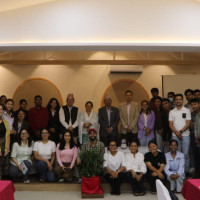- Tuesday, 1 July 2025
Being Human In AI Age
Imagine working hard for days to write an essay, only to see your friend submit a better one within a minute with the help of a robot. But wait, you don’t have to imagine the situation at all. Just take a good look at your surroundings. It is happening everywhere. After all, why struggle when someone else can do the work faster and better than you ever could?
The rise of AI is not only seeing the gradual downfall of various career paths but also the value of education itself. Using chatbots to generate reports and cheat in examinations makes people question the value of a degree, the hard work, and the qualifications it is supposed to represent. The gradual replacement of human resources with computers raises the question of the point of learning.
Learning is becoming less of a growth opportunity and more like a pointless chore. Why try hard when not trying at all happens to be the key to better results? Ten years ago, if you couldn’t solve a math problem, you would obsess over it, curse the book, and experiment, only to solve it with a completely unrelated formula. Do you remember feeling gratified when you finally got it right? When was the last time you got a similar feeling? When did you last ponder over something long and hard without using ChatGPT? We are forgetting how to experiment and be creative. We are trading our struggles for convenience—struggles that foster genius.
A few years back, our grades depended on our understanding of the topic, the length of the answer, its relevancy to the question, creativity, and sometimes even the teacher’s mood. Now, there is an additional step: AI detection. Assignments come with a note: Please do not submit AI-generated works. Well, you could search for relevant information on the internet, and based on that write by yourself, right? Wrong.
Ever scanned your work with an AI detector? If not, try it now. If it uses words such as furthermore, highlights, additionally, crucial, utilizes, underscores, etc., it will be flagged as AI. Simply because these words recur in AI-generated content doesn’t mean we humans are incapable of using them. But rules are rules, and you have to edit your work completely just to prove that your work is your own. It is extremely demoralising when you are suspected of cheating simply because your vocabulary is better than the average eighth-grader. Assignments now need a delicate balance between avoiding the use of overly formal or academic words, while preventing the writing from seeming like it was done by a ten-year-old after the simplification of complex terminologies.
Mentally, I can already hear some people protesting, “But AI does encourage creativity and exploration if you use it right, why isn’t that being mentioned?” I don’t deny it, even agree with the argument. But you are missing the point. Thus, I end this note with a challenge: Choose a topic about something you love and write an essay on it, without using AI even once. I bet it will feel weird. The challenge isn’t just to resist AI or its echoes, it is to rediscover something that is raw, unfiltered, and unmistakably human. Let's see if we can still sound like ourselves in this AI-driven world.
















